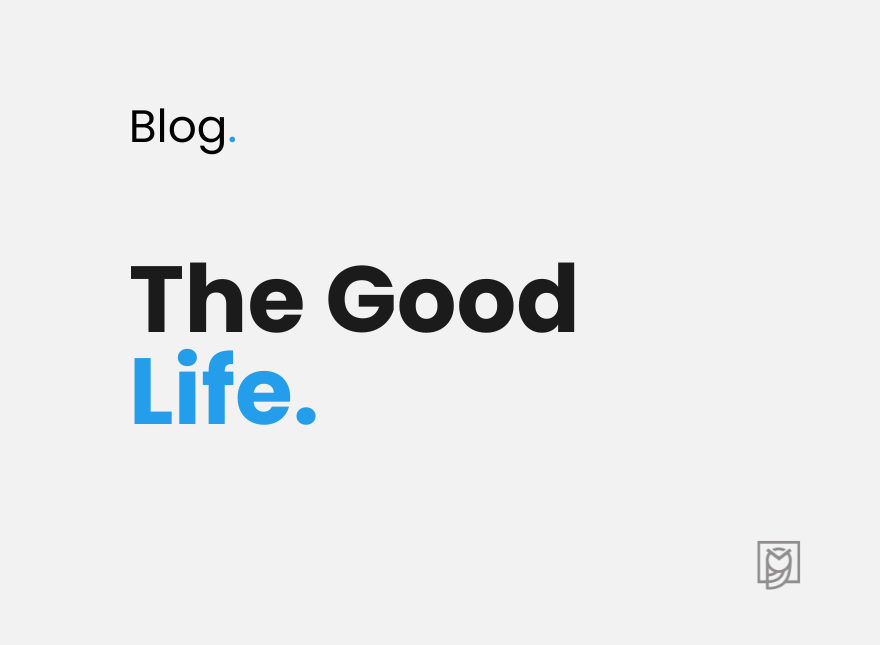For the better part of a decade, I’ve been on a quest to define “The Good Life.” What does it truly mean, and what does it look like for me?
The answers were not as simple as I initially thought.
In my teens and early 20s, my ambitions were straightforward: be “successful” which was the polite way of saying “rich.” However, I soon realised that success meant more than just having money. It had to encompass something deeper, something more fulfilling because I knew a lot of a**holes with money, and that’s not what I was after.
The birth of my son in 2012 was a turning point. It forced me to look beyond my own desires and consider a broader perspective on life. I began to ponder what kind of lifestyle I truly aspired to live.
This was the genesis of my framework for “The Good Life,” which, after years of refinement, now rests on five pillars:
- Philosophy/Spirituality
- Health & Well-being
- Relationships
- Wealth
- Social Impact.
Philosophy/Spirituality: Anchoring in Beliefs
The quest for meaning is foundational.
Your worldview shapes every aspect of your life. For me, this journey began with Stephen Covey’s “7 Habits of Highly Effective People,” where I came across the concept of paradigms.
Something that stuck with me about paradigms, is often, the way we view a “problem” can be the “problem”, therefore it can be valuable to be aware of the lens through which we see the world.
Understanding your core beliefs and biases is challenging yet immensely rewarding. It brings clarity and simplicity to life, even though the path to these answers is often complex and uncomfortable.
Everything in life is downstream from the mindset you adopt, and this is all shaped by your beliefs, so it’s worth it to examine them from time to time.
Health & Well-being: The Cornerstone of Life
A holistic approach to health is crucial. It’s not just about avoiding illness but achieving a balance of physical, mental, and emotional well-being.
My journey here is ongoing, especially as it has been the most neglected area of my life for a few years. However, facing my fears about health complications and a desire for a long and fulfilling life have prompted me to pay closer attention to this.
Small, consistent habits, as advocated by James Clear in “Atomic Habits,” have been transformative for me, it takes time, and I often have to remind myself it’s not just physical but also mental, but it’s an ongoing effort.
Relationships: The Fabric of Our Lives
The Power of Connection: Relationships define our human experience. Tony Robbins has a saying that stuck with me. “The quality of your life is the quality of your relationships.” This is true for familial bonds to friendships, romantic partners and professional associations.
The hard truth is relationships you develop can either help you or hurt you. And it’s, unfortunately, never a clear-cut thing. Relationships can be difficult, messy, and uncomfortable at times and take lots of effort to do well. But it’s most definitely worth it.
Building strong relationships requires authenticity, effective communication, empathy, and actively investing time and energy into relationships. It’s about quality, not just quantity.
The quality of your life is indeed the quality of your relationships. While navigating relationships can be challenging, the rewards are immeasurable. It’s about adding value and seeking meaningful connections, not just what you can gain.
The caveat here is dealing with people is HARD. But it’s a skill that can be learned and developed over time. Much of our perspectives on relationships are impacted by our childhood experiences, and over time, many of us have developed very unhealthy practices when it comes to relationships. This is where therapy and professional assistance come in. As someone who’s benefited from this over the years, I can’t continue to express how important this can be, so don’t discount it.
Wealth: A Tool, Not a Goal
You don’t get to enjoy much of life without the resources to do it. And money just happens to be one of the top 3 resources we need. Time and Energy are the other two. So understanding how to manage your finances is crucial. It’s about making informed decisions regarding earning, spending, and investing.
But wealth is not just about accumulating money but rather creating and managing resources (assets) that enable you to live your desired lifestyle.
My perspective on wealth was initially influenced by Robert Kiyosaki’s “Rich Dad Poor Dad,” which introduced me to the possibilities of business ownership at an early age.
For me, entrepreneurship has been a path to building wealth while also providing a platform for personal growth and impact. I’ve spent several years dedicated to learning as much as I can about money, business and wealth in general, and a large percentage of the content on this blog will be dedicated to just that, but I’ve found it valuable to remember that the assets, the money and the entire point of wealth are still a means to an end, and not an end itself.
It is about using resources to improve your life, and the lives of others, to the best of your ability and capability.
Social Impact: Leaving a Mark
I’ve struggled a lot to be where I am today. My struggles, including battling deep depression, have motivated me to, as cliched as it sounds, be the change and positive impact I wish to see. Whether through volunteering, philanthropy, or acts of kindness, contributing to the well-being of others is deeply fulfilling and I believe in working hard to help others progress, especially those who may be starting where I did.
In conclusion, “The Good Life” is a journey, not a destination. It’s about continuously refining your framework and living in alignment with your values.
If you’re interested in developing your own framework, here’s a link to a blog post that can help you get started: Creating Your Framework for The Good Life.


